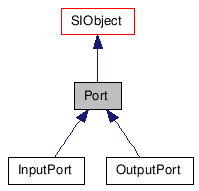Detailed Description
A port is an input or output connection to another object.
Actually, a port is more like a connection point on an operator, which may or may not be actually connected to something (some operator ports are optional).
Use SIObject::GetName to get the name of this port.
- See also:
- Operator, OperatorContext, UpdateContext, SIObject, InputPort, OutputPort
#include <xsi_port.h>

Public Member Functions |
|
| Port () | |
| ~Port () | |
| Port (const CRef &in_ref) | |
| Port (const Port &in_obj) | |
| bool | IsA (siClassID in_ClassID) const |
| siClassID | GetClassID () const |
| Port & | operator= (const Port &in_obj) |
| Port & | operator= (const CRef &in_ref) |
| bool | IsConnected () const |
| LONG | GetIndex () const |
| siPortType | GetPortType () const |
| CRef | GetTarget (void) const |
| LONG | GetGroupIndex (void) const |
| CString | GetGroupName (void) const |
| LONG | GetGroupInstance (void) const |
| siPortFlags | GetFlags (void) const |
| bool | GetBranchGroup () const |
| CString | GetTargetPath () const |
Constructor & Destructor Documentation
| Port | ( | ) |
Default constructor.
| ~Port | ( | ) |
Default destructor.
Member Function Documentation
| bool IsA | ( | siClassID | in_ClassID | ) | const [virtual] |
Returns true if a given class type is compatible with this API class.
- Parameters:
-
in_ClassID class type.
- Returns:
- true if the class is compatible, false otherwise.
Reimplemented from SIObject.
Reimplemented in InputPort, and OutputPort.
| siClassID GetClassID | ( | ) | const [virtual] |
Returns the type of the API class.
- Returns:
- The class type.
Reimplemented from SIObject.
Reimplemented in InputPort, and OutputPort.
Creates an object from another object. The newly created object is set to empty if the input object is not compatible.
- Parameters:
-
in_obj constant class object.
- Returns:
- The new Port object.
Creates an object from a reference object. The newly created object is set to empty if the input reference object is not compatible.
- Parameters:
-
in_ref constant class object.
- Returns:
- The new Port object.
Reimplemented from SIObject.
Reimplemented in InputPort, and OutputPort.
| bool IsConnected | ( | ) | const |
Returns true if the port is connected, false otherwise
- Returns:
- true if connected; false otherwise.
| LONG GetIndex | ( | ) | const |
Returns the port index of this port as a LONG
within its port group or -1 if there is a failure.
- Note:
- This index refers to the index of the port within the port group and is different from the index used to access the CRefArrays of InputPort or OutputPort references (available through Operator::GetInputPorts and Operator::GetOutputPorts).
- Note:
- This index is rarely a concern when implementing Self-Installed Custom Operators, because OperatorContext::GetInputValue is based on the CRefArray index for the InputPort and normally there is only a single output port (see OperatorContext::GetOutputPort).
- Note:
- When the Port is an output port, returned from a call to CustomProperty::AddOutputPort, this index may change if any input ports are added afterwards.
- Returns:
- LONG > 0 success
- -1 failure
| siPortType GetPortType | ( | ) | const |
Returns the type of the port, input or output.
- Returns:
- The Port type.
| CRef GetTarget | ( | void | ) | const |
Returns a reference object for the object connected to the port. If this function is called from the Update() context of a custom operator it will return an empty CRef.
- Return values:
-
out_pTarget the object to which the port is connected.
- Returns:
- A reference to the object connected to the port.
- See also:
- Port_Target2
| LONG GetGroupIndex | ( | void | ) | const |
Returns the index of the port group to which the port belongs.
- Returns:
- LONG > 0 success
- -1 means failure
| CString GetGroupName | ( | void | ) | const |
Returns the name of the port group to which the port belongs.
- Returns:
- The name of the port group (empty string means failure)
| LONG GetGroupInstance | ( | void | ) | const |
Returns the port group instance index for the port. There may be many objects of the same type connected to the same port group. Each object is connected to a port group instance, and within the port group instance there may be many ports.
- Returns:
- LONG > 0 success
- -1 means failure
| siPortFlags GetFlags | ( | void | ) | const |
Returns the mask of port flags described in siPortFlags.
- Returns:
- The mask containing port flags
- Since:
- 4.0
| bool GetBranchGroup | ( | ) | const |
Returns true if the port supports branch and group connections.
- Returns:
- true if the port supports branch and group connections.
- Since:
- 4.0
| CString GetTargetPath | ( | ) | const |
Returns a string containing the path to the target object.
- Returns:
- The path to the target object.
- Since:
- 4.0
The documentation for this class was generated from the following file:
